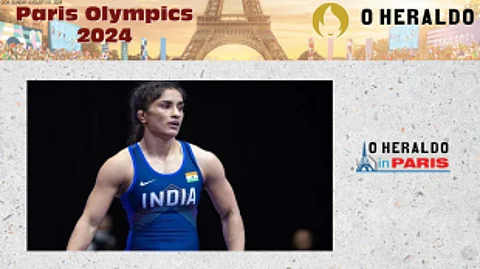

PARIS:India’s Paris Olympics campaign ended on Saturday. Reetika Hooda’s quarter-final exit in the women’s 76kg wrestling freestyle event and an under-par show by golfers Aditi Ashok and Diksha Dagar drew the curtains on a rather tepid show by the Team India. But wrestler Aman Sehrawat, who became the youngest Indian to win an Olympic medal on Friday, gave a sweet lining at the end of it all.
With just six medals, the same as London 2012 and one less than Tokyo 2020, the target to reach double digits at Paris 2024 could not be achieved. In the absence of a gold medal, Vinesh Phogat’s shocking disqualification for being ‘a few grams over 50kg’ ahead of her gold medal wrestling match and the subsequent petition at Court of Arbitration for Sport (CAS) to be awarded a silver has grabbed more headlines than anything else.
Phogat has continued to haunt Indian journalists covering the Paris Summer Games. Her disqualification has been the hottest topic of discussion, overshadowing the global media outrage around Algerian boxer Imane Khelif, who went on to win a historic women’s welterweight gold after being attacked for being a man.
Post Vinesh Phogat’s disqualification, every time an athlete has spoken to the Indian media, a question on weight and diet has cropped up. It has evoked both serious and light-hearted responses. After Sehrawat became the only India to win a wrestling medal at Paris 2024, questions on weight control and diet were inevitable.
Virender Singh, Sehrawat’s coach, said extra attention was paid to ensure that the Indian wrestler was within 57kg ahead of the weight-in for the bronze medal clash with Puerto Rico’s Toi Darian Cruz.
“We did not sleep the entire night. Training was on till 3 in the morning and every hour, we would monitor Aman’s weight,” said Singh, adding that Phogat’s case was a hard lesson.
"After my semi-final, to reduce my weight, I had two hours' practice in the venue and did gym from midnight to 3 am. That's how I reduced my weight. It was pretty difficult to achieve that scale,” said Sehrawat.
At the official press conference, all four medallists (two bronze medals are awarded in wrestling) were asked what is that one food they would like to binge on since the Olympics are now over.
Sehrawat, the soft-spoken 21-year-old, said, “kaju katli” (a rhombus-shaped thin cake-like sweet dish made with cashew nut paste and milk solids). It is a North Indian favourite. “When I was weight-cutting, I left all the sweets that I love. Now that I won the bronze, I want to eat them.”
Olympic champion Rei Higuchi of Japan said, “I'm in Paris. I love French macarons, so I would love to drown myself in them,” adding: “57kg for an adult man, it’s hard to maintain because if you overeat even a little bit, you have to change your weight category, so a lot of attention is paid to weight control.”
Silver medallist Spencer Richard Lee of the United States, whose parents met in France and were both judo Olympians for America, did not specify any dish but said: “… something sweet probably.”
Uzbekistan’s Gulomjon Abullaev, who also got the bronze, is not a sweet tooth. His next target on the dining table will be to gorge on “Uzbek plov (also known as pilaf)”. It is a traditional rice dish made with lamb, beef, lots of carrot, onion and whole garlic head.
The journey of an athlete is full of sacrifices. The ones who fight in specific weight categories like in wrestling and boxing have to be doubly careful to watch their weight. In Paris 2024, after Phogat’s case, stories of Indian wrestler Antim Panghal and boxer Nikhat Zareen “starving for two days” ahead of their bouts have emerged. That’s food for thought for the support staff that manages the athletes.